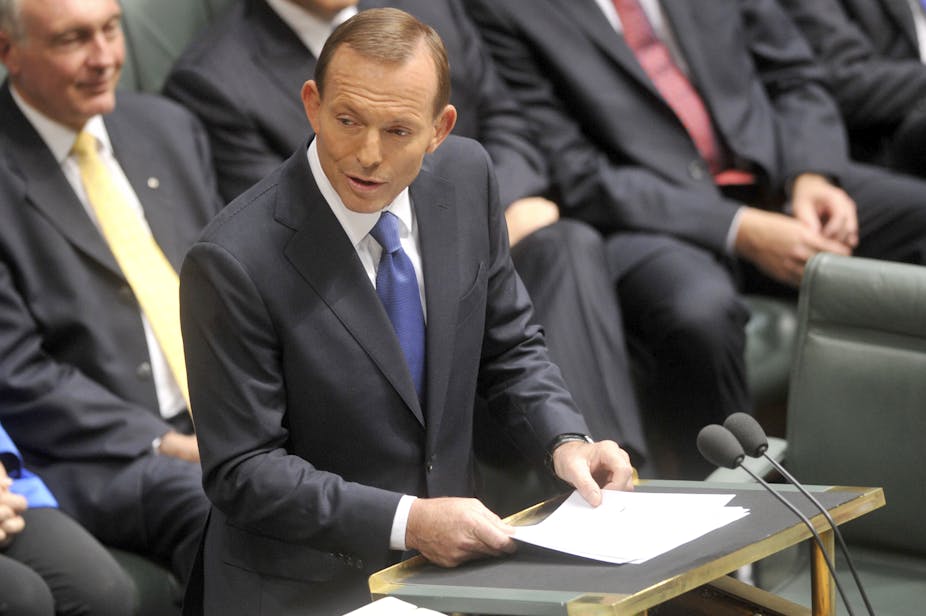It is not that this budget was a bad one. It’s that, according to most people on both sides of politics, voters aren’t listening anymore.
Budget week seemed not a big economic moment, but principally another staging point in the election campaign, full of complicated tactical play.
The government used its sixth budget to lay traps for the opposition, locking in big long-term spending on disability and schools and outlining savings that included a hit on middle class welfare which Tony Abbott had to accept or fight.
But at week’s end Abbott did not look like a man who had been cornered.
He joined forces with the government on disability, while all but giving the thumbs down to the schools money.
He criticised the savings but in his budget reply indicated the Coalition will swallow them for its own bottom line. Meanwhile he produced some old and new savings of his own - which of course were immediately attacked by the government - to pay for his new promise that a Coalition government would continue the current compensation for the carbon tax after it scrapped the tax.
Yet another strange week has ensured that the post-September 14 government will deliver the budget’s multi-billion dollar raft of savings which now have, in effect, bipartisan agreement, whatever unpleasant things the opposition is saying about them. That this has happened when we are four months from an election and the political contest is red hot is rather remarkable.
If this budget had been brought down in the middle of the term, there would have been a lot of complaint and political argy bargy over individual measures.
But a general recognition, including in the community, that some austerity is required and the opposition’s need to keep off the political sticky paper have minimised controversy.
What an irony that partisan needs are imposing a strange bipartisanship in the last days of this parliament of nastiness.
First it was the unity ticket on the increase in the Medicare levy to help pay for the disability insurance scheme. Abbott, usually feral on tax issues, not only embraced a tax rise but ensured it would be passed before parliament ends rather than being an election issue, as Gillard had hoped.
Nobody can criticise anybody for this tax rise, because the disability scheme has become iconic; Abbott has succeeded in having disability a symbol of unity, rather than issue for argument over funding at the election.
After Abbott’s response on the budget savings we have got this week, with minimum delay or trouble, a common position on the abolition of the baby bonus, and economies in family payments and Medicare.
Fiscal imperatives forced Labor to cut. Political imperatives required the opposition to agree. If “losers” want to carp, who do they complain about, given that both sides have ended up holding hands (while also holding their noses)?
The government is so unpopular that it is the one likely to cop any backlash, although that should be limited because there will now be less debate about them.
The savings are mostly upside for Abbott – the government has made some hard decisions and a Coalition government would inherit the dollars.
Finally, we’ve seen Abbott’s bipartisan embrace of the carbon compensation in his budget reply. “You need certainty to plan your future”, Abbott told voters, all part of his line that under a Coalition government there will be no surprises and no excuses.
Abbott used to be adamant that the compensation had to go because it wouldn’t be needed once the tax wasn’t there. He would bring in his own tax cuts and welfare payments.
Now he has concluded what was obvious all along: unpicking benefits people already have is fraught. Best to accept the status quo, although it costs a lot (some A$4 billion annually) to do so. But he was never going to be able to leave people worse off, so his very own package would have been expensive too.
This does invite the question: Tony, if there is a strong case for keeping the carbon compensation, there is also a powerful one for retaining the carbon price itself, which is also going to be hellish to unwind. That logic will remain a bridge too far for Abbott, who gained his initial traction fighting that “great big new tax” (which, once it floats and links to Europe in 2015, will mutate into a much more modest creature).
But the election now won’t have any contest between competing tax/welfare packages.
That leaves Gonski as the one area where the partisanship increased this week. Abbott may judge that Gillard, with NSW Liberal Barry O'Farrell the only premier signed up, won’t be able to get a respectable level of support from the states. If she fails and Abbott runs hard against the school funding program, it will be a major election battleground.
Apart from the budget itself, budget week had its moments and diversions, including Gillard breaking down during her speech introducing the Medicare levy rise for the disability scheme and the government making a fresh “misogyny” attack on Abbott after the opposition whip refused a pair for a Labor woman with a sick baby who wanted to go home a few hours ahead of time (she got the pair after the fuss).
Then there was Craig Thomson, who announced he’ll run again for his seat as an independent. This means that when the put-upon electors of Dobell throw him out, he’ll be eligible for severance pay. A tiny hit on the budget but surely a case of insult being added to injury.

